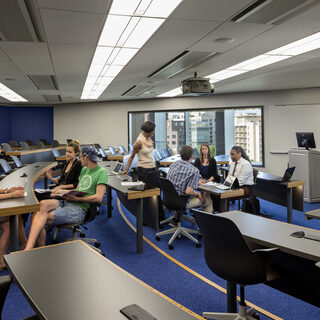Tradeline's industry reports are a must-read resource for those involved in facilities planning and management. Reports include management case studies, current and in-depth project profiles, and editorials on the latest facilities management issues.
Latest Reports
Addressing Biosafety Regulations with Risk Assessment and Verification Planning
Using a verification planning process to meet current regulations—for directional airflow, atmospheric pressure reference, containment barriers, and other common compliance measures—with solutions based on risk analysis and standard operating procedures (SOPs), takes a project through planning and design to fully licensed and operational, and helps minimize spending on solutions to a level that is risk-appropriate.
Milken Institute School of Public Health
The new building housing George Washington University's Milken Institute School of Public Health provides the first real home for the school, which was established in 1997. It brings together seven departments occupying space in various university buildings and several leased locations in and around GW’s Foggy Bottom campus. Just blocks from the White House, the school draws heavily upon its location to bring the real-world perspective of legislators, practitioners, and researchers to public health education.
Wexford's @4240 Building
The three-story, 183,000-sf “@4240” building—originally constructed in 1948 as a telephone handset factory—provides flexible tenant solutions, including customized labs for both large- and small-molecule research; dry labs for electronic, medical device, or software research; and modern office space.
Facility Space Planning with the Help of Big Data
With an overwhelming amount of space data—collected from and managed by RFID chips, space utilization models, visual schedule maps, BIM—the best outcomes increasingly rely on the ability to analyze, distill, and communicate that information, according to Jeff Funovits and Alex Wing, principals with Stantec. This is particularly true when it comes to the design and planning of medical, research, and educational environments, where efficiency and meaningful learning or clinical outcomes are the measures of success.
Advanced Colony Data Management System Dramatically Improves Vivarium Efficiency
Genentech’s custom-built colony management system (CMS) is allowing the organization to dramatically improve efficiency and reduce waste at its massive 150,000-sf vivarium facility east of San Francisco. In its first year of implementation, the system reduced operational inefficiencies by more than 150 percent and saved the organization more than $2 million, while also improving living conditions for mice and empowering husbandry and colony management staff.




